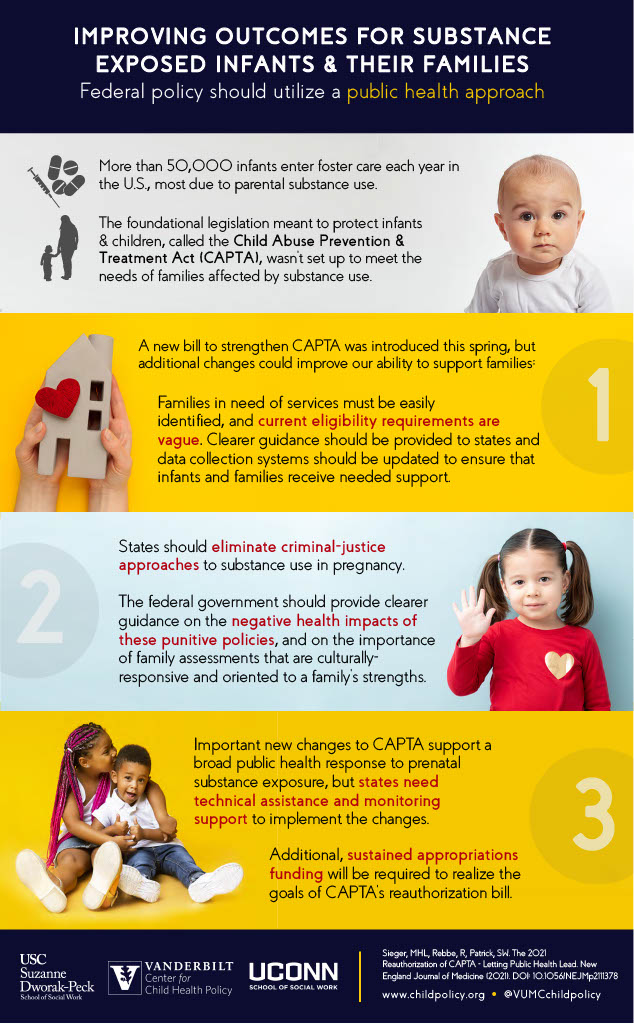The proposed reauthorization of the federal Child Abuse Prevention and Treatment Act, also known as CAPTA – the foundational child abuse prevention legislation in the United States – has the potential to drastically and positively impact infants exposed to drugs and alcohol in utero.
But according to researchers at the University of Connecticut, the University of Southern California, and the Vanderbilt University Medical Center, policymakers and administrators will need to focus on CAPTA’s implementation to correct the shortcomings of the past and to achieve a public health approach to addressing the needs of substance-exposed infants.
“I have been studying CAPTA implementation for the last six or seven years,” says Margaret Lloyd Sieger, an assistant professor at the UConn School of Social Work. “It is a piece of legislation that has the potential to positively impact parents with substance use disorder and infants with substance exposure, but depends so much on implementation.”
In a “Perspective” article published by the New England Journal of Medicine, lead author Lloyd Sieger; Rebecca Rebbe, assistant professor at the USC Suzanne Dworak-Peck School of Social Work; and senior author Dr. Stephen Patrick, associate professor of pediatrics and health policy and director of the Vanderbilt Center for Child Health Policy, discuss the challenges that CAPTA has faced in addressing the needs of this vulnerable population and the promise of the proposed reauthorization bill – an even more critical issue in the face of the ongoing nationwide opioid epidemic.

“The opioid crisis has taken a substantial toll on pregnant women and infants, spilling over into our nation’s child welfare system,” says Dr. Patrick. “Across the country, more than 50,000 infants enter foster care each year, most because of parental substance use.”
The last revisions of CAPTA provisions concerning substance-exposed infants happened in 2010 and 2016, but were underfunded and slowed state-level adoption. The Senate’s proposed reauthorization this year substantially increases requested funds to support the many systems-level changes it describes. The reauthorization also explicitly provides implementation assistance to states from the National Center on Substance Use and Child Welfare, an organization that has rich systems-level experience in this area, Lloyd Sieger notes.
“This reauthorization offers a chance for states to receive more tailored guidance in implementing their own multi-disciplinary strategy,” she says. “But, in order for its passage to make a difference, healthcare providers need to know about the policy, some of its nuance, and areas where additional support will be needed.”
In their “Perspective,” the researchers note that, while placing children in foster care should be avoided whenever possible, the number of infants and young children removed from their families for parental substance use has increased over the past decade, suggesting that additional changes are needed to CAPTA to help support families.
“While placement in a foster home can be necessary to ensure a child’s safety, it can also be traumatic for both the child and the parent struggling with a substance use disorder,” says Rebbe. “CAPTA’s reauthorization presents an opportunity to provide supports and services to families at a critical time in a non-punitive manner.”
They note that ways that affected infants and families are identified and determined to be eligible for CAPTA services are unclear or challenging and, while the reauthorization takes some steps to increase clarity, more is needed to ensure that those most in need of services receive them. States will also have to develop new systems for notification, data collection, and creation of family care plans to comply with the reauthorization. While some states – like Connecticut – have already implemented strategies and can serve as models, substantial investment, technical assistance, and monitoring will be needed.
“Parents in these circumstances are often already filled with shame and guilt, and ensuring that they receive compassionate, treatment-focused care and trauma-informed support is critical,” says Lloyd Sieger. “The reauthorization uses much clearer terminology and is crystal clear in its aims to support, not punish, these families. To be effective, though, states will need additional guidance on who this policy applies to and funding to engage multiple systems, including public health, hospitals, substance use treatment, and child protection, in its implementation. The reauthorization also calls upon states to create a new infrastructure for working with these families, and that is going to require a lot of resources.”
But, the researchers say, the promise of the reauthorization marks an important step toward adopting a public health approach to substance-exposed infants.
“The Senate’s CAPTA reauthorization presents an incredible opportunity for Congress and the Biden Administration to shift our nation’s child welfare system’s focus to public health and improving treatment for pregnant women with substance use disorder,” Dr. Patrick says. “We have the opportunity to keep infants safe and improve outcomes for both pregnant women and infants, now is the time to take it.”



